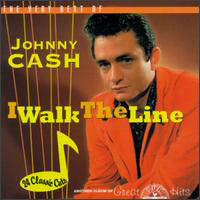Cash still money

September 25, 2003
“I shot a man in Reno / Just to watch him die.”
The most famous line from “The Man in Black,” better known as country legend Johnny Cash.
Cash died the morning of September 12, 2003 at a hospital in Nashville, Tenn. According to his manager, Cash died of respiratory failure resulting from complications of diabetes. Cash was 71.
Johnny Cash may have passed away, but he is not gone; his music, as well as his contributions to music, will be ever present in the hearts and minds of his followers.
U2’s “The Edge” described the most recognizable voice in Country music as, “…a voice, all wailing freight trains and thundering prairies, like the landscape of his beloved America.”
Johnny Cash sang about the Old West. Cowboys, Indians and railroads all found their way into his music.
Cash was his own man, a rebel and did things differently than those around him. Two of his albums were recorded at state prisons.
One was recorded at Folsom Prison and the other in San Quentin. Willie Nelson called him, “one of the original outlaws.”
He has had a profound and lasting impact on the world of music.
“His vocal style has always been one of the most distinctive and his songs and recordings are amongst some of the most memorable ever,” said Paul McCartney, ex-Beetle and music legend.
Johnny Cash was simply ahead of his time. According to johnnycash.com, long before the term “concept album” was coined, Cash created such thematically unified albums as “Ride This Train”(1960), “Blood, Sweat, & Tears” (1963), “Bitter Tears” (1964) and “Johnny Cash Sings Ballads Of The True West” (1965).
Cash was not only skilled at writing his own music, but he also performed cover songs of other artists, sometimes better than the original. One such example was his cover of Tom Petty’s “I Won’t Back Down.”
“His ability to take a song and make it his own is just uncanny. I heard him sing my song “I Won’t Back Down,” and I just thought, God, he must have written that, because it never rang so true to me as when I heard him sing it.”
Johnny Cash was a very talented musician and established a long list of successes and high points throughout his career.
According to johnnycash.com, Cash was the youngest person ever chosen for the Country Music Hall of Fame and the only performer ever selected for the Country and Rock Music Hall of Fame, until 1998, when Elvis Presley was inducted into the Country Music Hall of Fame.
Cash won 11 Grammys, including the 1999 Lifetime Achievement Award.
Other awards include his three most recent albums, “American Recordings” (1994), “Unchained” (1998), and “Solitary Man” (2000).
Cash had chart success as a solo artist, as part of a duet, as the leader of a trio and as a part of the award-winning Highwayman Quartet.
And more of his albums, about 45, remain in print today– more than most artists ever make.
Johnny Cash toured extensively and visited many countries and cities.
Iowa was not forgotten. In 1970, Johnny Cash attracted 25,300 people for two shows at the Iowa State Fair, the third largest Grandstand crowd; only behind Sonny and Cher’s 26,200 and the Beach Boys’ 25,400 people.
Students at Simpson felt the great loss of Johnny Cash.
“I’m sad to see him go. He was a big name in country music and a pretty legendary guy,” sophomore Reid Leichty said.
Sophomore Brandon Schrunk agreed. “His death was a big loss to the music world,” he said.
Johnny Cash provided the world with great music all his life.
His final recording, released in 2003, was a touching rendition of “Hurt,” a song originally written and performed by Trent Reznor of Nine Inch Nails.
“His music video for Hurt gave me shivers the first time I saw it,” Schrunk said.
Legendary songwriter, singer and poet Leonard Cohen couldn’t have said it better, “He’s always there, the tallest figure in the circle of integrity, the deepest voice when night comes down and the bravest take on sanity in the midst of wild confusion. Thank you, sir. The generations will be listening.”




